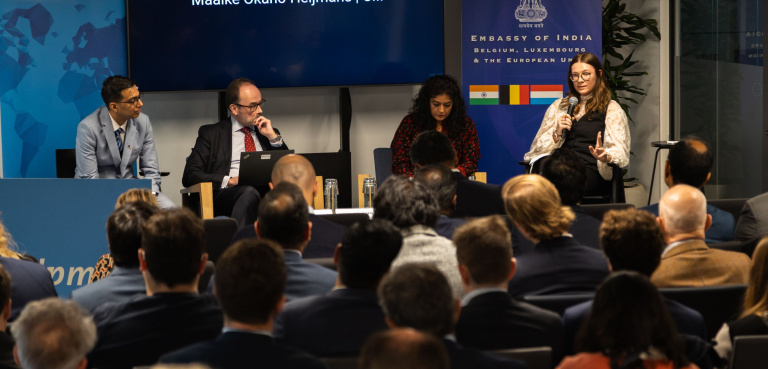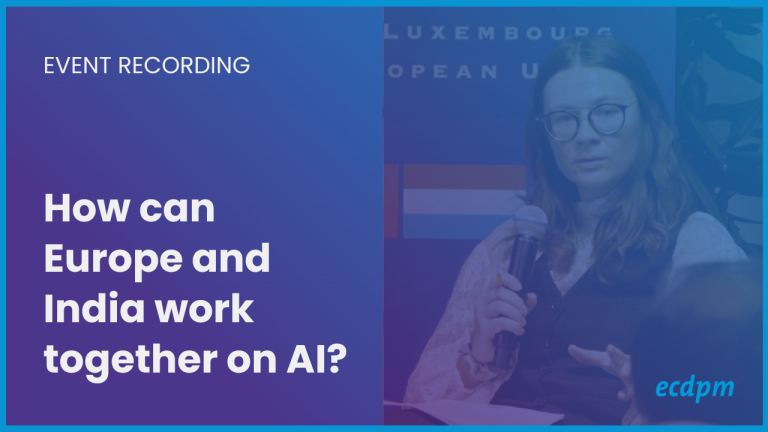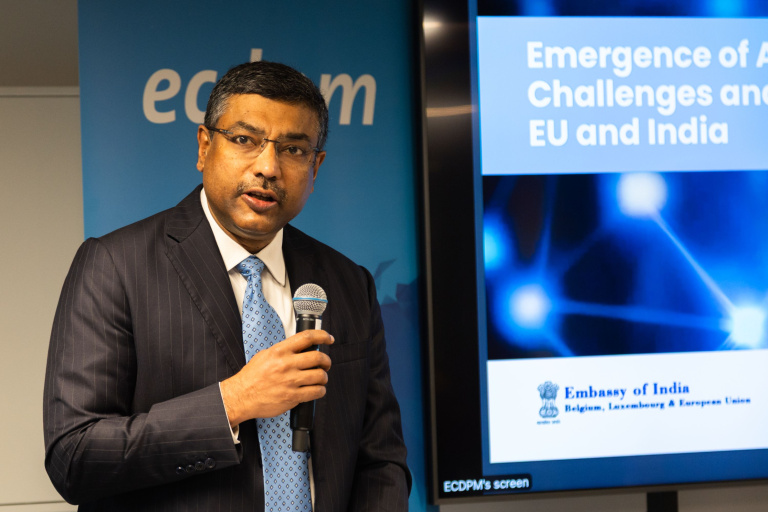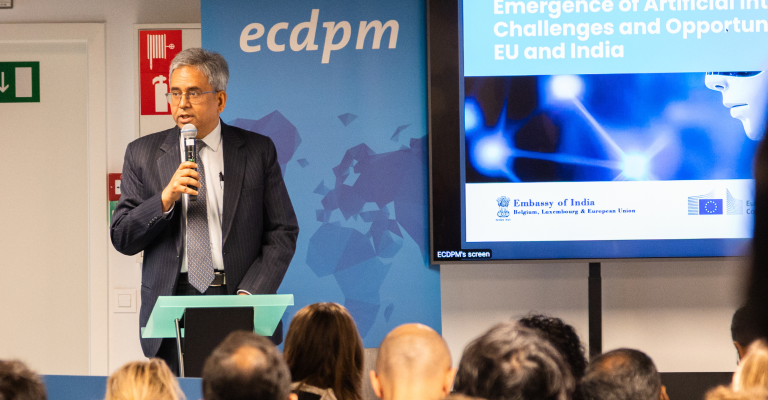
Full-stack ahead: A bright future for the EU-India technology partnership
2025 has seen significant progress in EU-India relations. But while both sides are keen to deepen technology cooperation, particularly through a "full-stack" approach to de-risk supply chains and foster joint innovation in areas like semiconductors, AI, and 6G., ECDPM has been busy on the trickier side of any growing relationship: facilitating the mutual dialogue and shared understanding necessary to transform ambition into a durable, equitable reality.
This year has so far turned out to be an annus mirabilis in the EU-India relationship. Volatile geopolitics and geoeconomics have created a shared imperative for the EU and India to bolster cooperation on national security and economic competitiveness. The pace of official exchanges has catapulted in 2025: it is now crucial to prioritise exchanges with think tanks, academics and the private sector to drive forward the partnership, notably on technology.
In February, the EU demonstrated its seriousness about the partnership with an unprecedented visit of the entire College of Commissioners to New Delhi. This was followed by the publication of its Joint Communication on a New Strategic EU-India Agenda in September 2025, as well as the flurry of exchanges and political pressure in recent weeks to finalise the Free Trade Agreement negotiations.
It takes more than diplomatic meetings to create a strong partnership between two powers. Even as EU-India official exchanges gather momentum, European and Indian societies do not know each other well.
In response, India has shifted its views of the relationship with Europe, especially after the February visit. With contentious tariff negotiations and foreign policy resets dominating the India-US relationship, Europe is increasingly viewed as an important destination and reliable partner for both Indian companies and highly skilled talent. In fact, Indian companies are increasingly looking to expand in Europe - the value of mergers and acquisitions into Europe by Indian firms reached $5.7 billion in 2025, more than any other full year since 2020.
On technology, the EU’s vision of “open strategic autonomy” demands that it should build partnerships with key countries like India, Brazil, Japan, South Korea and others in a spirit of strategic interdependence. As the EU seeks to derisk its industrial supply chains and deepen alliances, the time is ripe for deepening people-to-people exchanges, notably by launching a dialogue between key stakeholders on EU-India technology policy.

L to R: Gautam Kamath (ECDPM), Juha Heikkilä (European Commission), Vidhya Sampath (Tata Consultancy Services), Marta Przywała (SAP).
Tea-ing off the TTC
It takes more than diplomatic meetings to create a strong partnership between two powers. Even as EU-India official exchanges gather momentum, European and Indian societies do not know each other well, without meaningful exchanges and dialogue at the societal level, with few universities or think tanks on either side having deep knowledge of the history, politics and regulatory culture of the other side.
Meanwhile, despite growing private sector exchange, the potential for joint innovation and investment is still vastly underexplored. Deepening relations between the EU and India will require a major expansion of knowledge and exchange between the policy and business ecosystems.
There is growing support on both sides for expanding EU-India exchanges from regular meetings between the bureaucracies to broader stakeholder platforms, involving think tanks, academia, civil society and industry. A similar process took place alongside the EU-US Trade and Technology Council (TTC) in the past.
In that spirit, ECDPM convened a first high-level dialogue on EU-India Cooperation on Artificial Intelligence on 31 October, featuring India’s Secretary of the Ministry of Electronics and IT (MeitY), the Indian Ambassador to the European Union, senior officials from the European Commission’s AI Office and DG CNECT, as well as representatives from India’s largest IT company Tata Consultancy Services, Germany’s largest company SAP, and Dutch think tank Clingendael Institute. It was a rainy Friday morning at the start of a school holiday, but that did not prevent a packed room of relevant policy professionals, who were greeted with warm chai and Indian snacks.
With this event, we aimed to bring perspectives from think tanks, the private sector and the wider policy community into the EU-India TTC, which has to date been dominated by official exchanges. We also demonstrated that there is real appetite for such a dialogue and began to construct a community of experts and policy professionals to participate in a multistakeholder dialogue into the future.
Watch the event in full here
This is a great opportunity for a win-win: Europe needs to secure its semiconductor capacity... India wants to boost local production and create high-tech jobs for its vast reservoir of engineering talent.
Ambassador Saurabh Kumar set the scene, underlining the key meeting of EU and Indian officials on digital cooperation in the EU-India TTC format that would take place the same afternoon. The keynote address was given by S. Krishnan, Secretary MeitY, who articulated the need for EU-India cooperation across the AI stack, starting with the development of indigenous foundation models, to developing the right frameworks for sharing talent and deepening research collaboration and investment.
He reflected on India’s inherent optimism for technology, citing the comparatively high adoption rate of Generative AI by India’s businesses, and highlighted India’s “techno-legal” approach to digital infrastructure as a “third way.” India also aims to play a leading role in the global governance of AI, hosting the India AI Impact summit in February 2026 and deepening ties with AI safety institutes in key countries.
In the following panel, Juha Heikkilä from the European Commission’s AI office mirrored the Indian government’s enthusiasm for strategic cooperation. Both Marta Przywała from SAP and Vidhya Sampath from Tata Consultancy Services highlighted the importance of India’s large market and talent pool for Europe. They also noted the importance of leveraging AI in enterprise in a trustworthy fashion, while flagging the need to address emerging security risks to increase trust. Maaike Okano-Heijmans from Clingendael Institute detailed how Europe and India could collaborate on open-source AI and highlighted the need to harmonise their respective approaches to digital sovereignty.

Full-stack cooperation
An interesting shift since the EU-India TTC discussions is a focus on viewing the relationship through the lens of the ‘technology stack’. In the ‘strategic technologies, digital governance and digital connectivity’ working group, you will see a ‘value chain-wide’ approach to finding complementarities across critical areas in a holistic manner - right from critical minerals to semiconductors, AI, telecoms and connectivity, and all the way up the stack to aligning on DPIs, data and platform regulation. This is a promising development, one that ECDPM has pushed for in From India Stack to Euro Stack.
‘Full-stack cooperation’ is essential to de-risk supply chains, and India and the EU can jointly take this further by investing in building up semiconductor manufacturing. This is a great opportunity for a win-win: Europe needs to secure its semiconductor capacity, especially for the lower-end silicon that goes into products that Europe sells on the global stage (cars, fridges, industrial machinery) and where it has important players in the semiconductor value chain. India wants to boost local production and create high-tech jobs for its vast reservoir of engineering talent. This logic applies to all critical sectors of the economy where the two sides share complementarities: whether it is 6G research and telecom standards development, investing in the joint development of the geospatial industry, quantum computing, or developing indigenous applications for artificial intelligence.
In response to a question regarding progress on India’s Semiconductor Mission, Secretary Krishnan shared how India was focusing on low and medium-range chips and not cutting edge, with the goal to create resilient digital supply chains relevant to sectors with wider consumption like automotive manufacturing. He exhorted European industry to deepen collaboration and promised to facilitate investment. He also shared that MeitY will be releasing its AI governance framework within a few days upon his return. Such candid exchanges are rare, but extremely important to build trust.
ECDPM aims to continue providing opportunities for similar exchanges and to support the building of such trust between the two sides. Together with partner think tanks in Europe and India, ECDPM hopes to develop a platform for developing a meaningful dialogue among policymakers, businesses and policy researchers, enabling a more meaningful cooperation to evolve and grow.
The views are those of the authors and not necessarily those of ECDPM.





